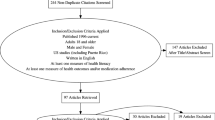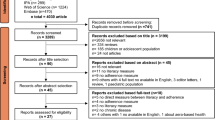Abstract
Health literacy significantly impacts health-related outcomes among people living with HIV. Our aim was to systematically review current literature on health literacy interventions for people living with HIV. The authors conducted a thorough literature search following the PRISMA statement and the AMSTAR checklist as a guide, and found six studies that met inclusion/exclusion criteria. The majority of these interventions were designed to improve HIV treatment adherence as well as HIV knowledge and treatment-related skills, with one study focusing on e-Health literacy. Several of the studies demonstrated trends toward improvement in medication adherence, but most did not achieve statistical significance primarily due to methodological limitations. Significant improvements in knowledge, behavioral skills, and e-Health literacy were found following interventions (p = 0.001–0.05). Health literacy interventions have the potential to promote HIV-related knowledge, behavioral skills, and self-management practices. More research is needed to assess the efficacy of interventions to promote a variety of self-management practices.

Similar content being viewed by others
References
CDC. HIV care saves lives 2014 [cited 2015 July 15, 2015]. Available from: http://www.cdc.gov/vitalsigns/HIV-AIDS-medical-care/.
Institute of Medicine. Health literacy: a prescription to end confusion. National Academies Press; 2004.
United States Department of Health and Human Services. HIV/AIDS Continuum of Care 2015. Available from: https://www.aids.gov/federal-resources/policies/care-continuum/.
Holtzman CW, Brady KA, Yehia BR. Retention in care and medication adherence: current challenges to antiretroviral therapy success. Drugs. 2015;75(5):445–54.
Gardner EM, McLees MP, Steiner JF, del Rio C, Burman WJ. The spectrum of engagement in HIV care and its relevance to test-and-treat strategies for prevention of HIV infection. Clin Infect Dis. 2011;52(6):793–800.
Paasche-Orlow MK, Parker RM, Gazmararian JA, Nielsen-Bohlman LT, Rudd RR. The prevalence of limited health literacy. J Gen Intern Med. 2005;20(2):175–84.
Baumann KE, Phillips AL, Arya M. Overlap of HIV and low health literacy in the southern USA. Lancet HIV. 2015;2(7):e269–70.
Centers for Disease Control and Prevention. Health Literacy 2015 [cited 2015 August 24, 2015]. Available from: http://www.cdc.gov/healthliteracy/learn/.
McCray AT. Promoting health literacy. J Am Med Inform Assoc. 2005;12(2):152–63.
Norman CD, Skinner HA. eHealth literacy: essential skills for consumer health in a networked world. Journal of medical Internet research. 2006;8(2).
Berkman ND, Sheridan SL, Donahue KE, Halpern DJ, Viera A, Crotty K, et al. Health literacy interventions and outcomes: an updated systematic review. Evidence Report/Technology Assesment No. 199. (Prepared by RTI International—University of North Carolina Evidence-based Practice Center under contract No. 290-2007-10056-I. AHRQ Publication Number 11-E006. Rockville, MD. Agency for Healthcare Research and Quality. March 2011.
Graham J, Bennett IM, Holmes WC, Gross R. Medication beliefs as mediators of the health literacy–antiretroviral adherence relationship in HIV-infected individuals. AIDS Behav. 2007;11(3):385–92.
Kalichman SC, Pope H, White D, Cherry C, Amaral CM, Swetzes C, et al. Association between health literacy and HIV treatment adherence: further evidence from objectively measured medication adherence. J Int Assoc Phys AIDS Care (JIAPAC). 2008;7(6):317–23.
Kalichman SC, Ramachandran B, Catz S. Adherence to combination antiretroviral therapies in HIV patients of low health literacy. J Gen Intern Med. 1999;14(5):267–73.
Kalichman SC, Rompa D. Functional health literacy is associated with health status and health-related knowledge in people living with HIV-AIDS. J Acquir Immune Defic Syndr (1999). 2000;25(4):337–44.
Wolf MS, Davis TC, Osborn CY, Skripkauskas S, Bennett CL, Makoul G. Literacy, self-efficacy, and HIV medication adherence. Patient Educ Couns. 2007;65(2):253–60.
Önen NF, Overton ET, Seyfried W, Stumm ER, Snell M, Mondy K, et al. Aging and HIV infection: a comparison between older HIV-infected persons and the general population. HIV Clin Trials. 2010;11(2):100–9.
Ball SC. The aging HIV population. Clin Pract. 2014;11(2):221–31.
Holtzman C, Armon C, Tedaldi E, Chmiel JS, Buchacz K, Wood K, et al. Polypharmacy and risk of antiretroviral drug interactions among the aging HIV-infected population. J Gen Intern Med. 2013;28(10):1302–10.
Centers for Disease Control and Prevention: HIV among people 50 and older 2015 [cited 2015 11/02/2015]. Available from: http://www.cdc.gov/hiv/group/age/olderamericans/index.html.
Centers for Disease Control and Prevention. HIV among older Americans 2015 [cited 2015 11/02/2015]. Available from: http://www.cdc.gov/hiv/pdf/library_factsheet_HIV_AmongOlderAmericans.pdf.
Osborn CY, Paasche-Orlow MK, Davis TC, Wolf MS. Health literacy: an overlooked factor in understanding HIV health disparities. Am J Prev Med. 2007;33(5):374–8.
Murphy PW, Davis TC, Long SW, Jackson RH, Decker BC. Rapid estimate of adult literacy in medicine (REALM): a quick reading test for patients. J Read. 1993;37(2):124–30.
Parker RM, Baker DW, Williams MV. The test of functional health literacy in adults. J Gen Intern Med. 1995;10(10):537–41.
Weiss BD, Mays MZ, Martz W, Castro KM, DeWalt DA, Pignone MP, et al. Quick assessment of literacy in primary care: the newest vital sign. Ann Family Med. 2005;3(6):514–22.
Altin SV, Finke I, Kautz-Freimuth S, Stock S. The evolution of health literacy assessment tools: a systematic review. BMC Public Health. 2014;14(1):1207.
Ownby RL, Waldrop-Valverde D, Hardigan P, Caballero J, Jacobs R, Acevedo A. Development and validation of a brief computer-administered HIV-related health literacy scale (HIV-HL). AIDS Behav. 2013;17(2):710–8.
Moher D, Liberati A, Tetzlaff J, Altman DG. Preferred reporting items for systematic reviews and meta-analyses: the PRISMA statement. Ann Intern Med. 2009;151(4):264–9.
Shea BJ, Grimshaw JM, Wells GA, Boers M, Andersson N, Hamel C, et al. Development of AMSTAR: a measurement tool to assess the methodological quality of systematic reviews. BMC Med Res Methodol. 2007;7(1):10.
Kmet LM, Lee RC, Cook LS. Standard quality assessment criteria for evaluating primary research papers from a variety of fields: Alberta Heritage Foundation for Medical Research; 2004.
Higgins JP, Green S. Cochrane handbook for systematic reviews of interventions: Wiley Online Library; 2008.
Robinson C, Graham J. Perceived Internet health literacy of HIV-positive people through the provision of a computer and Internet health education intervention. Health Inf Libr J. 2010;27(4):295–303.
Kalichman SC, Cherry J, Cain D. Nurse-delivered antiretroviral treatment adherence intervention for people with low literacy skills and living with HIV/AIDS. J Assoc Nurses AIDS Care. 2005;16(5):3–15.
Kalichman SC, Cherry C, Kalichman MO, Amaral C, White D, Grebler T, et al. Randomized clinical trial of HIV treatment adherence counseling interventions for people living with HIV and limited health literacy. J Acquir Immune Defic Syndr (1999). 2013;63(1):42.
Van Servellen G, Carpio F, Lopez M, Garcia-Teague L, Herrera G, Monterrosa F, et al. Program to enhance health literacy and treatment adherence in low-income HIV-infected Latino men and women. AIDS Patient STDs. 2003;17(11):581–94.
Van Servellen G, Nyamathi A, Carpio F, Pearce D, Garcia-Teague L, Herrera G, et al. Effects of a treatment adherence enhancement program on health literacy, patient-provider relationships, and adherence to HAART among low-income HIV-positive Spanish-speaking Latinos. AIDS Patient Care STDs. 2005;19(11):745–59.
Ownby RL, Waldrop-Valverde D, Caballero J, Jacobs RJ. Baseline medication adherence and response to an electronically delivered health literacy intervention targeting adherence. Neurobehav HIV Med. 2012;4:113.
Cohen MS, McCauley M, Gamble TR. HIV treatment as prevention and HPTN 052. Curr Opin HIV AIDS. 2012;7(2):99.
Kalichman SC, Cherry C, Kalichman MO, Amaral C, White D, Grebler T, et al. Randomized clinical trial of HIV treatment adherence counseling interventions for people living with HIV and limited health literacy. JAIDS J Acquir Immune Defic Syndr. 2013;63(1):42–50.
United States Department of Health and Human Services. The National HIV/AIDS Strategy for the United States 2015 [updated July, 2015; cited 2015 August 13]. Available from: https://www.aids.gov/federal-resources/national-hiv-aids-strategy/nhas-update.pdf.
Author information
Authors and Affiliations
Corresponding author
Ethics declarations
Conflict of Interest
The authors declare that they have no conflict of interest.
Rights and permissions
About this article
Cite this article
Perazzo, J., Reyes, D. & Webel, A. A Systematic Review of Health Literacy Interventions for People Living with HIV. AIDS Behav 21, 812–821 (2017). https://doi.org/10.1007/s10461-016-1329-6
Published:
Issue Date:
DOI: https://doi.org/10.1007/s10461-016-1329-6




